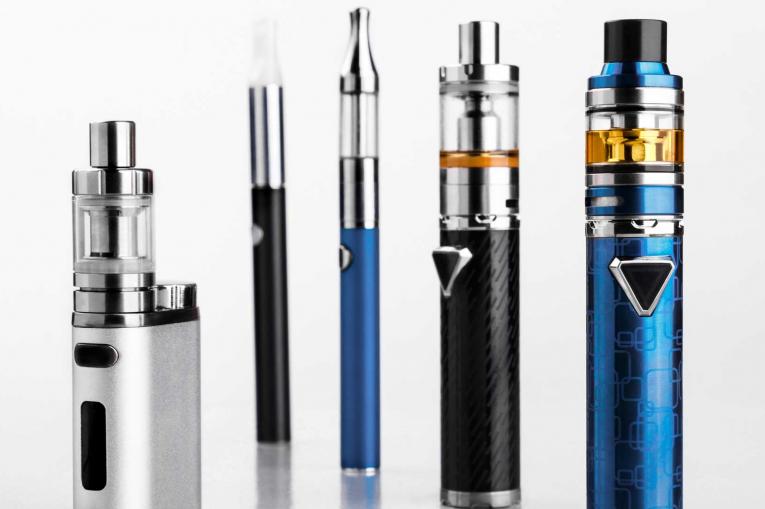Newcastle Stop Smoking + Service - In partnership with the NHS
We’re here to help you stop smoking in a way that works for you
Stopping smoking at a young age has lots of benefits right away, and it can help you avoid smoking-related diseases later in life.
Are you a school nurse?
Find out how you and your school can help more students stop smoking with our free training sessions.

Tips to help you quit
- Ask friends and family to support you. Choose people who you can be honest with, and who'll be honest with you.
- Enlist your friends - Make a deal with friends who also want to quit to support each other.
- Prepare excuses for saying no - It can be difficult to tell friends you’re stopping smoking, so prepare something ready to say when you're offered a cigarette.
- Do your best to stay away from alcohol, coffee, sugar, and sweets. Studies have shown that these (especially alcohol) can stimulate cigarette cravings.

What stop smoking products can young people get?
Stopping smoking can be hard, but there is lots of support and treatment options available.
Getting the right treatment to suit you is very important. Your advisor will talk you through the options and what works best for you.
You can choose from:
Nicotine lozenges (Only to be used if advised by a GP)
Nicotine gum
Nicotine patches
Nicotine mouth spray
Nicotine inhalator.
If you’re aged between 12-18 years old, you can get these products free on your prescription. You can also choose more than one product to help you with your cravings. All conversations are confidential.
Read a full list of the pros and cons of each product here
How stopping smoking can improve your health and wellbeing
Smoking can cause short and long-term effects. This means the more you smoke and the longer you smoke for, the more chance you will start to see these effects.
The short-term effects of smoking include:
- Stained teeth and gum and tooth disease, including losing your teeth
- Chronic coughing, increased phlegm, lung conditions like emphysema and bronchitis and being more likely to get the flu.
- Blocked airways, which will cause your lungs to not work properly.
- Shortness of breath and phlegm.
- A faster heartbeat that can lead to heart problems later in life.
- Hearing loss, eyesight problems and headaches.
- Bad breath and reduced sense of smell.
- Your home, car and clothes will smell of smoke.
The long-term effects of smoking include:
- Increased risk of heart disease.
- Increased risk of chronic lung disease.
- Increased risk of lung and other cancers.
Reasons to stop smoking
- You'll be healthier and less out of breath – smoking decreases your lung capacity.
- You'll save a lot of money.
- You'll look better. Chemicals in cigarettes restrict blood flow to your skin. Smokers have more wrinkled and droopy faces by the time they're in their mid-20s.
- Quitting helps save the planet. Deforestation because of tobacco production accounts for nearly 5% of overall deforestation in the developing world.
- Someone who starts smoking at 15 is three times more likely to die from cancer than someone who starts smoking in their mid-20s.
- The younger you start smoking, the more damage there'll be to your body as an adult.
- Smoking can make it harder to start a family later in life. It can make men less fertile and makes women more at risk of complications during pregnancy and labour. Babies of people who smoke are also more at risk of sudden infant death syndrome (SIDS).

What are vapes?
E-cigarettes are also called, e-cigs or vapes. They’re battery operated and contain nicotine, but they don’t burn tobacco and don’t create smoke. They come in lots of different types and flavours.
Vapes are less harmful than smoking cigarettes because they don’t burn tobacco. Switching to a vape could support you to quit smoking.
Myths about e-cigarettes
- Vapes are as harmful as smoking. - Public Health England reports that vapes are 95% less harmful than cigarettes. It is the tobacco, and the 4000+ other chemicals and carbon monoxide in cigarettes that are harmful to the body.
- Secondhand vapour is harmful. – There is no evidence to support this.
- Vaping is more addictive than smoking. – Nicotine is addictive. Nicotine is in vapes and cigarettes, so one is not more addictive than the other.
Rumours and myths about smoking
There are lots of rumours and myths around stopping smoking. There’s no truth behind them and they shouldn’t put you off stopping.
Myths
‘The damage is done. Quitting now won’t make any difference.’
It’s never too late to stop smoking. As soon as you quit, your body will begin to repair itself. You’ll notice improvements in your breathing, sense of taste and smell just a few days after stopping. Within a year, you’ll have reduced risk of cardiovascular and respiratory disease.
You’ll also improve the health of your family and friends by protecting them from secondhand smoke.
‘I’ll put on weight'
It’s normal to have concerns about gaining weight when giving up smoking. Some people do put on weight after they stop. This is down to nicotine suppressing your body’s natural appetite and making it burn calories faster.
Not everyone who quits smoking will gain weight. Some people do put on weight after they stop but this is your body adjusting to being smoke-free. Nicotine stops you from feeling hungry and makes you burn calories faster, but this is unhealthy in the long run.
Some people quit smoking and replace it with unhealthy snacking. You can address this by keeping to a healthy diet and exercising regularly.
‘Nicotine is harmful’
Nicotine is a very addictive substance but it isn’t harmful. It’s the other ingredients and chemicals in tobacco smoke that will affect your health, such as carbon monoxide and tar. This is why Nicotine Replacement Therapy can help you to stop smoking. It will give you a clean, safe dose of nicotine.
To quit successfully, you need to deal with:
- Your chemical addiction to nicotine.
- The fact that smoking has become part of your daily routine.
‘I’ll get stressed’
Despite this popular myth, it’s been proven that non-smokers usually have lower stress levels than smokers.
You may find you feel more relaxed after having a cigarette because:
- Nicotine returns to the level you feel comfortable with.
- It stimulates the release of a feel-good chemical in the brain called dopamine.
Nicotine stops your brain from being able to control dopamine naturally except for when you smoke. After 3 months of being smoke-free, your body will be able to control dopamine properly on its own again.
‘My smoking doesn’t harm anyone else’
Secondhand smoke can affect other people’s health. Smoking has been banned in all enclosed public places across the UK.
People who don’t smoke themselves but breathe in secondhand smoke have:
- 20% to 30% higher risk of contracting lung cancer or stroke
- 25% to 30% higher risk of coronary heart disease.
Secondhand smoke can also be very harmful to children. They also breathe in a lot more secondhand smoke than adults.
Stay smoke-free when feeling stressed
When you’re stressed you might get cravings for nicotine. Cravings can be annoying or even scary, but there are lots of ways to manage them and make yourself less stressed. Here are some you can try yourself.
How can your school nurse help?
If you attend a school in Newcastle then your nurse can give you advice and support. Your school nurse will be able to talk to you about smoking and help guide you in setting a quit date along with using nicotine replacement therapy. They could also refer you to an out of school service if you feel that would work better for you.
Understanding smoking and your weight
You may be worried about your weight changing when you stop smoking. Changes to your weight are a normal part of your body adjusting to being smoke-free but there are steps you can take to keep weight gain to a minimum.
Why do some people put on weight when they quit?
There are 5 main reasons:
- Smoking speeds up your metabolism, so your body burns calories at a faster rate. When you stop smoking, you actually need fewer calories.
- Smoking can suppress your appetite.
- Some people get cravings for sugary food when they stop smoking.
- It’s possible to mistake nicotine cravings for feeling hungry or to eat to distract yourself from them.
- You may replace the ‘hand-to-mouth' action of smoking with snacking.
How can I avoid putting on weight when I quit?
- Keep your metabolism high by taking regular exercise. Try to be more active by walking rather than getting the bus, go for a run or bike ride, play sports with your friends, join a gym, dance to your favourite music, or do an online aerobic session.
- Combat hunger pangs by keeping a stash of healthy treats to hand. Nuts, fresh fruit, and veg sticks are ideal.
- Eat smaller portions of food until your metabolism has stabilised. It takes 20 minutes for you to feel full after eating, so take a break (go for a walk) after your main meal and see if you still feel hungry in half an hour. If so, dip into your healthy treats.
- Make sure you’re taking your stop smoking products regularly to help suppress cravings. The less you crave nicotine, the easier it’ll be to keep focused.

Things you should know about shisha
What’s in shisha?
Shisha usually contains tobacco which is sometimes mixed with fruit or molasses sugar. Common flavours include apple, strawberry, mint, and cola. Wood, coal, or charcoal is burned in the shisha pipe to heat the tobacco and create smoke.
What are the risks?
Shisha often contains the same type of tobacco you get in cigarettes. This means shisha smokers are at risk of the same health problems as cigarette smokers, such as cancer and heart disease.
Because Shisha can contain nicotine you can become addicted to smoking shisha. A World Health Organisation study has suggested that one hour of smoking shisha can be the same as smoking 100 or more cigarettes.

Secondhand smoking
Breathing in other people’s smoke is known as secondhand smoke or passive smoking. When you smoke, it’s not just your health that’s affected, but the health of anyone around you.
Most secondhand smoke comes from the tip of a burning cigarette. This makes it almost impossible to direct smoke away from those around you. If you only smoke in one area of your home the harmful chemicals will spread from room to room and can linger for up to 5 hours. If you smoke in a confined space such as a car, you’re exposing other passengers to even more harmful chemicals.
Risks to other people
People exposed to secondhand smoke face the same effects as smokers themselves. They inhale the same harmful gases and chemicals found in tobacco smoke. Their risk of developing smoking-related diseases will also increase.
Pregnant women exposed to secondhand smoke will pass on harmful chemicals to their babies. Secondhand smoke is also particularly harmful to children, and anyone with a long-term heart and/or breathing conditions.
Short-term effects
Some short-term effects from exposure to secondhand smoke include:
- Coughing.
- Headaches.
- Eye and nose irritation.
- Sore throat.
Long-term effects
Long-term effects from exposure to secondhand smoke include increased risk of:
- Coronary heart disease.
- Lung cancer and other cancers.
- Stroke.
- Increased risk of a lung disease called chronic obstructive pulmonary disease (COPD) and other breathing problems.
Breathing in secondhand smoke makes the blood stickier, meaning there is more risk of blood clots forming. A blood clot can block an artery and cause:
- Heart attacks.
- Strokes.
- Angina.
- Complete heart failure.

What your first appointment will look like
Thinking about your first appointment doesn’t have to be scary. Our helpful and friendly advisors will be with you every step of the way. You’ll have your own advisor to speak to every week and they’ll support you along the way.
During your first chat they’ll go through the following:
- They’ll get to know you and your smoking habits
- Talk through the reasons why you want to stop smoking
- They’ll go through what products are available to help with cravings
- They’ll work with you to put a plan together to quit.
All conversations are free and confidential. We won’t judge you or tell you what to do. The first appointment can last up to 30 minutes, and then each follow up appointment will be 15 minutes to see how you’re getting on. All appointments can be on the telephone or face-to-face.
